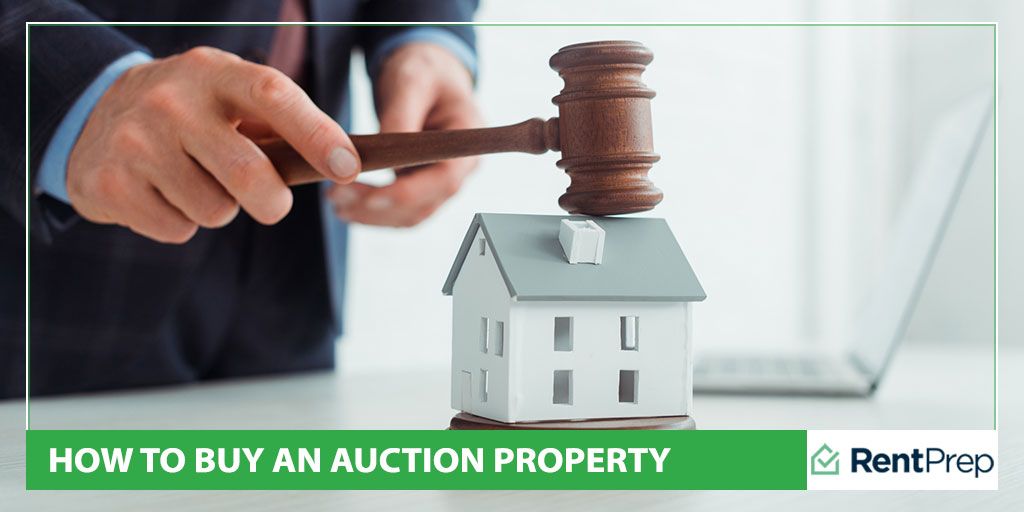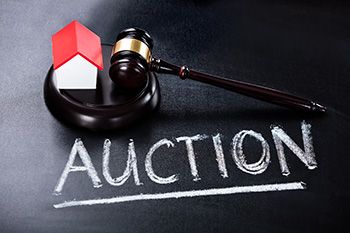
It’s a common belief that buying auction homes is a great way to find a deal and expand your portfolio when working as a landlord. Experienced landlords, however, will tell you that simply knowing how to buy an auction property is not enough. You must also learn when the risk is worth it because buying auction homes is riskier than many realize.
You could wind up investing in a money pit without being well-versed in how house auctions work and what type of investment research should be done before an auction.
That said, it can also pay off to take the risk. The lore of house auctions being a source of excellent investment properties is sometimes true, but there’s more to it than luck when things work out this way. Today, we’ll cover everything you need to know about how real estate auctions work, buying an auction house, and deciding if you should take the risk.
Table Of Contents On Buying Auction Homes
Buying a house at auction is an alluring idea. What landlord wouldn’t want to get a house at a price below market value and turn it into a successful investment property? To succeed at this, however, there’s a lot to learn:
- Why Are Houses Put To Auction?
- Why Landlords Should Buy Houses At Auction
- The Risks Of Buying Houses At Auction
- How To Buy An Auction Property
- FAQs: How To Buy At House At Auction
- Buying A House At Auction: Is It Worth It?
Why Are Houses Put Up For Auction?

To fully understand the process of buying a house at auction, it’s important to first understand why houses are put up for auction in the first place. There are a few different ways properties end up on the auction block. Let’s take a brief look at them all.
Foreclosures
The most common way a house ends up at auction is due to foreclosure. This occurs when the property owner doesn’t pay the mortgage and falls into default. Eventually, this can lead to the lender taking possession of the house and putting it up for auction to repay the money owed.
Property Tax Default
Another way that properties end up going to auction is due to unpaid property taxes. The tax authority eventually takes control of the property and puts it up for auction to pay off after the tax lien. This auction is typically handled through the local jurisdiction or tax controller.
As-Is Sales
Sometimes, the property owner simply wants to unload the property fast and as-is. Sales on auction markets often go faster than on the traditional market, which is desirable for some property types. Large, expensive homes can be sold this way, but it is more commonly seen with houses in disrepair.
Why Landlords Should Buy Houses At Auction
What might draw landlords and investors to buy houses at auction when they cannot even see the house in person or inspect it? Ultimately, these benefits make the risk worth it in certain cases.
#1: Bargain Shopping
The biggest reason investment-minded individuals take this risk is the chance for a bargain. Houses can go for low prices at auction. Even with considerable repair required, that can be desirable for those who want investment properties, but cannot secure properties priced at market value.
#2: Fast Closings
Ready to expand and expand fast? Auctions go fast from bids to closing, which can be very desirable. The ability to get started on your next investment project right away rather than going through a lengthy escrow period and closing process is great motivation for many landlord buyers at auctions.
#3: Learn
Finally, learning from the experience and experienced investors at auctions can be enlightening. Seeing the prices paid, the bids placed, and the types of properties that draw the most interest will help you understand what experienced buyers find most enticing. This can be good for finding bargains yourself and learning indicators of a good buy.
The Risks Of Buying Houses At Auction
Risks may be the first thing you think about when considering buying a house at auction. Just as you consider the benefits, it’s important to think realistically about the drawbacks of purchasing an investment property in this way.
#1: No Inspections Or Interior Visits
The biggest drawback is not being able to have the property inspected or to view the inside of the property in person before bidding. While there are exceptions to this, it’s typically not possible to get any type of inspection or appraisal before bidding.
#2: Paperwork
Auctions are a different buying process than traditional sales. Suppose the property is a foreclosure or otherwise seized asset. Be sure to read all paperwork clearly, and work with a real estate attorney if possible so that nothing is missed. The purchase terms will ensure you are protected as much as possible.
#3: Financing
Cash is often required for home auctions, meaning you must have a large amount of cash on hand. While some auction houses allow financing options, they may be more limited or at higher interest rates than you are used to. This is a big investment, so you should be careful about getting in over your head.
Take a look at this recent interview with an auction auctioneer who gives tips and tricks for bidding on a property:
How To Buy An Auction Property
1. Find Interesting Opportunities

First, you’ll need to track down auctions that are interesting to you and suit your business needs. There are both physical auctions and online auctions, though you can typically find listings for all types of auctions online. Sites like Auction.com give a good breadth of information about upcoming auctions.
Additionally, you can contact local government offices to find out how they report upcoming foreclosures, default sales, and other types of auctions. They can direct you to where you will find the most accurate information, and they may also have insider intel on what’s coming up soon.
Some real estate websites and MLS databases also have foreclosure listings, though you may need to work with a licensed agent or broker to access some of this data.
2. Do Your Research
Start researching the property as much as possible. Search public records or work with a local title company to see if there are any claims or liens on the property that could affect your use of it. Do a drive-by to ensure it’s not occupied and find out what the condition seems to be.
If possible, you may want to look for previous listing information. You can even contact local agents, appraisers, and contractors to get their opinions on the property and its value based on the available information. They will have good insight as they are experienced in a related field.
3. Payment Potential & Fees
If you decide to move forward, it’s time to determine what payment and fees will be required at the base level.
Most houses purchased at auction will incur the following fees, at a minimum:
- Premiums: Can be a flat fee or between 5-10% of the purchase price
- Transfer fees: $1,000+
- Auction service fees: $3,000+
- Online usage fee: $200+
Additionally, you will need to have the bidding deposit on hand as a type of earnest money to make your bid. If you fail to pay for the property, you will lose this deposit so you must be prepared to cover not only your purchase price but all the additional fees as well.
Prepare proof of finances, a cashier’s check, and legal entity documentation if you purchase the property through your LLC or business. These documents will all be necessary to make bids and purchases through auctions.
If you can finance the purchase according to the auction terms, you will still need to have deposit money on hand as well as proof of pre-approval for financing. There may also be finance vendors at the auction, but it’s good to come prepared.
4. Make Your Bid!
Once you are successfully registered, it’s time to start bidding. If you win, you must pay the full amount within a predetermined time. Often, you will have just 24 hours to complete the transaction. Follow all auction rules to the T to ensure the transaction processes smoothly, or you will lose out on both the property and your deposit.
Get Started Successfully
Whether you’re a brand new landlord or have done some property management already, it can be overwhelming when starting or expanding your business. As experts in this field, we’ve created a great form kit for landlords.
Every form that you need to get started can be found right here. Whether you’re writing leases, providing notices to tenants, or organizing yourself, we’re here to help guide you to success.
Our in-house expert, Andrew Schultz, recently shared his auction tips for bidding on a rental property. Check it out here:
FAQs: How To Buy At House At Auction
Do I have to pay for a house in full on the day of an auction?
The terms of what will need to be paid at auction vary by auction and by auction service, but you may not be paying for the house in full at auction.
In the case of foreclosures, however, it may be preferred or required for the full purchase to happen that day. Many auction houses do not work this way, but some do.
You will likely need to make at least a downpayment on the property when the auction closes if you win. You will also need to pay application auction fees and closing costs. Auction companies often require that you prove you have this money on hand either through an online escrow service or a cashier’s check before you can bid. Check the details of any auctions that you’re interested in to be sure.
Auctions may request proof of funds for the full amount of the house. If financing is allowed, they will also request proof of pre-approval. If you cannot prove you can pay for the property, it will likely be passed to the next highest bidder.
Can I see the inside of a house at auction before bidding?
Houses at auction are typically sold unseen. Depending on the type and terms of the auction, there may be various pictures showing the inside of the house, but it will not be as thorough as you would see in person.
Additionally, you will not be receiving or seeing a house inspection before buying. That is why the process is too risky for many investors, but it is also how you can get something amazing at a low price.
Will I work with a real estate agent when bidding on a house at auction?
No; you will be working directly with a third-party institution like a bank, a broker, or the auction house selling the property. Real estate agents are not part of this process. You will see necessary financing and title company employees as the sale closes, but you do not need to worry about securing a real estate agent to bid at an auction.
Is it possible to finance a house bought at auction?
It is possible to finance a house bought at auction in some cases. Ultimately, it is up to the group selling the house to decide what will and will not be accepted. Many auction houses allow financing and may even have their preferred lenders on-site at the auction to set up the financing for buyers.
You may also be allowed to bring pre-approval from another third-party lender to show you can finance the purchase. Check the auction terms in advance to ensure you have the necessary funds and documentation before bidding.
Buying A House At Auction: Is It Worth It?
There’s no cut-and-dry way to determine if buying a house at auction is worth it. The investment will always be risky because you cannot get as much information on a property as you can when using a more traditional buying process.
Still, the old adage holds true: With great risk comes great reward.
Researching a property, preparing your payment, and holding out for the true hidden gems is the best way to take advantage of houses at auction. Remember to consider the following when you’re making a decision on whether or not a house is worth it:
- Are you financially prepared to make a downpayment and finance the house?
- Have you checked the location and public property records, and driven by the property?
- Do you have the capital on hand to do the necessary repairs and get the investment property rented out as soon as possible?
If you answered “no” to any of the questions above, the time isn’t right. Work on understanding and preparing yourself further for the auction process before diving in. Auctions will still be around when you’re ready, and this is an investment choice that you shouldn’t rush.

